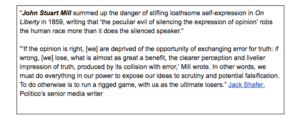
On August 7th, former Google software engineer James Damore was punished for circulating a 10-page document that he and others have described as a “reasoned, well-researched, good-faith argument.” The opposing opinion is that his document furthered a trend of sexism in the tech world. The document was “circulated internally” and it raised “questions about cultural taboos and how they cloud our thinking about gender diversity at [Google] and in the wider tech sector.”
According to Damore, “Everything changed when the document went viral within the company and the wider tech world. Those most zealously committed to the diversity creed—that all differences in outcome are due to differential treatment and all people are inherently the same—could not let this public offense go unpunished. They sent angry emails to Google’s human-resources department and everyone up my management chain, demanding censorship, retaliation and atonement.” And then, James Damore was fired.
The reason given? Portions of his statement “cross the line by advancing harmful gender stereotypes in our workplace.”
In this article, four scientists critique and broadly support the scholarly work of Damore. One scientist raises the question – what do those who judged and ultimately fired Damore know about the scientific studies of sexual selection theory, animal behavior, and sex differences that he “dispassionately” discussed in the document?
As a society, have we replaced fact-based research with emotionally based responses? If so, is this the direction we want to go in America?
Regardless of agreement or disagreement with his document, according to John Stuart Mill: by silencing those with Damore’s opinion – because those who share a similar opinion learned that they should keep their mouths shut – we all lose.
On August 12th, in Charlottesville, Virginia a scheduled rally took place against the removal of a Robert E. Lee statue. This ‘Unite the Right’ effort had a permit for its rally, and participants included leaders associated with the alt-right movement as well as self-proclaimed neo-Nazis, white supremacists and members of the KKK. After the protesters marched through the University of Virginia campus with lit torches on Friday night and before the scheduled event kicked off on Saturday, counter protesters arrived to protest against the ‘Unite the Right’ rally. Participants in the counter protest included self-proclaimed members of Black Lives Matter and Antifa.
I had never heard of Antifa before, so I looked it up. According to CNN, “Antifa is short for anti-fascists. The term is used to define a broad group of people whose political beliefs lean toward the left – often the far left – but do not conform with the Democratic Party Platform. The group doesn’t have an official leader or headquarters, although groups in certain states hold regular meetings.”
The events of the day were tragic on countless levels that are not addressed in this column. The tragedy in our nation included, but was not limited to, the death of a 32-year-old woman who was part of the counter protests and two police officers who died in a helicopter crash.
A Politico article entitled, The Good News About the Nazis: America’s tolerance of fascist idiots is one of its greatest strengths, links us back to John Stuart Mill and a timeless lesson.
Politico’s senior media writer Jack Shafer explains how free speech, while not able to right every wrong, “can take credit for reversing or ending many of the shameful practices and episodes in our history—slavery, lynching, Jim Crow, race riots, discrimination, quotas, housing covenants, disenfranchisement of women voters, etc.”
“By extending and protecting First Amendment rights to speakers who express contemptible thoughts, America distinguishes itself. Many nations suppress ugly views by law.”
“The suppression of free expression, as we’ve seen in places like Germany and France, does little to extinguish detestable thought. It merely drives it underground, where it survives and sometimes thrives because it escapes inspection and criticism by its most articulate critics.”
Shafer pulls on John Stuart Mill’s quote that started this column, and concludes:
“White supremacists have been with us since the beginning of the republic. We’ll probably never be rid of them. Our best hope for containing them is to deny them the victim- and martyr-status they covet. And the best way to do that is to smother them in First Amendment protections and hope that they suffocate on them.”
To read more about free speech in America – from history to today – check out The Policy Circle’s brief, “The First Amendment: Free Speech and Academic Freedom in America,” and consider sharing it with a friend.